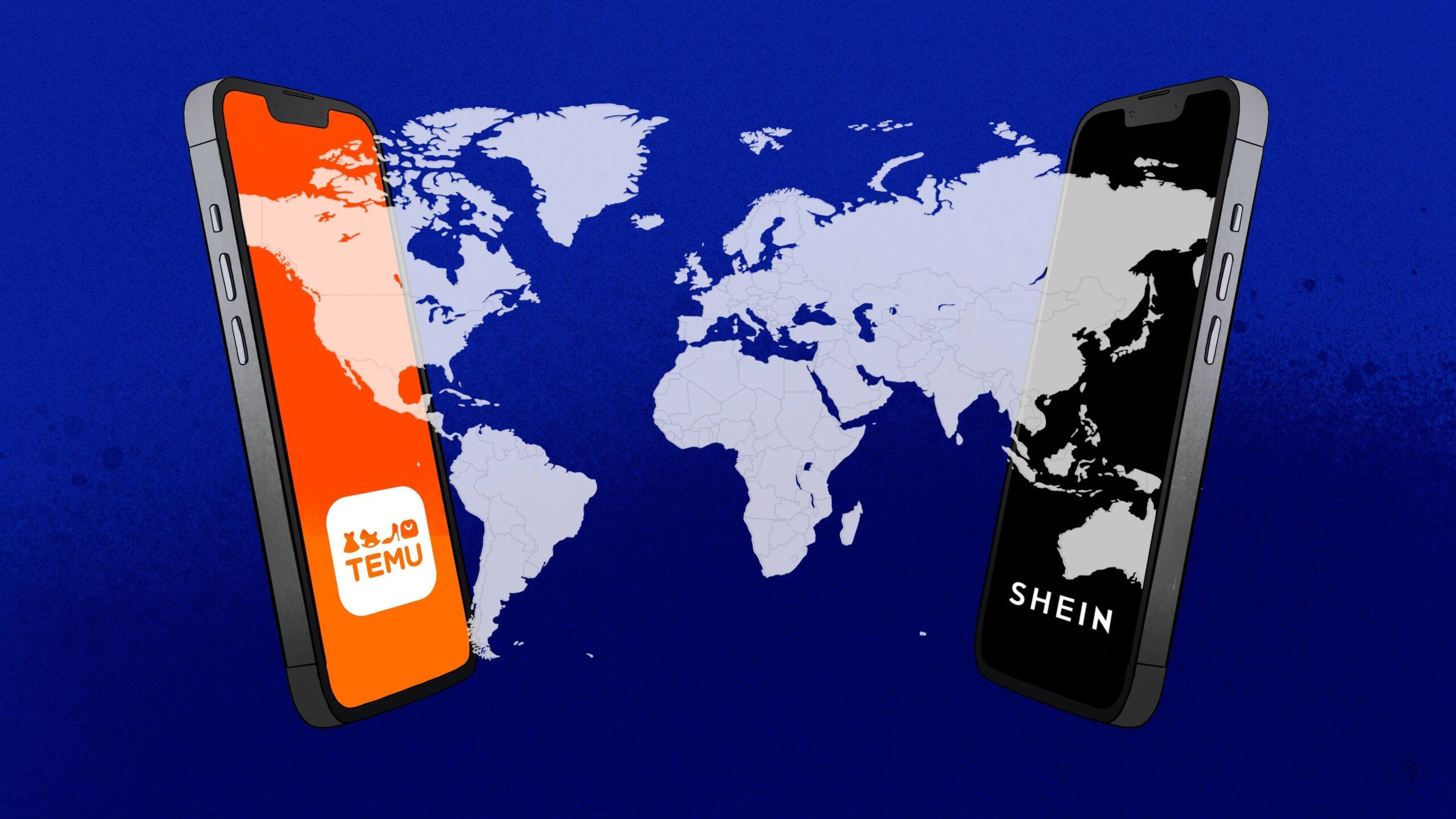Temu vs Shein: Which platform will rule the ecommerce world?
China is the world leader in online retail, and its ecommerce firms are venturing out into the world. As two major firms battle it out on the global stage, what are the stakes, and how will ecommerce competition within China affect their performance?

Over the past decade, online retail in China has surged to levels unmatched anywhere in the world: In 2022, 27.2% of consumer goods were purchased online in China, up from 6.2% a decade earlier.
Looming large over the sector are Alibaba’s Taobao and TMall platforms, JD.com, and Pinduoduo, which battle for Chinese consumers’ business, and increasingly look to overseas markets for growth opportunities. Newer platforms like Shein, Temu (owned by Pinduoduo’s parent company, PDD Holdings), and Alibaba’s AliExpress now offer low priced alternatives in many countries outside of China.
In recent months, Temu has taken the U.S. market by storm, topping app store download rankings, and making waves with a couple of big-ticket Superbowl ads. As Temu has risen, Shein has moved to defend its dominant position over cheap clothing ecommerce in the U.S., suing Temu in American courts over allegations that Temu paid online influencers to post negative content about Shein. The legal battle mirrors the ongoing fight for market share, playing out in price wars, employee poaching, and other cutthroat tactics.
China news, weekly.
Sign up for The China Project’s weekly newsletter, our free roundup of the most important China stories.
Clash of the titans
Temu is making serious moves to outcompete Shein in the U.S. But the company will have to do much more to unseat its formidable adversary. Shein’s meteoric rise and its unique and effective business tactics have been well-documented. Shein leaves clothing design to its many independent suppliers, bringing thousands of new designs online daily, vastly outpacing the likes of Zara and H&M, and providing consumers with an extraordinary multitude of choices which are driven by algorithms: When an item proves popular, software reorders it from suppliers while resources aren’t allocated to manufacturing designs that perform poorly.
The efficiency is bolstered by Shein’s Chinese background. Unlike foreign competitors, which also often use Chinese labor to make fashion products, Shein’s location and cultural competency give it an edge when it comes to managing suppliers.
Shein’s geographic edge is somewhat neutralized when it comes to competition with Chinese firm PDD Holdings. Ties to Pinduoduo allow Temu to similarly leverage on-the-ground presence in China.
PDD Holdings has deep pockets, and has said it plans to use its resources to boost Temu. This has already included major funding for placement, including high-profile Superbowl ads, and heavy subsidies for price cutting in order to attract new customers, earning itself the label of “price butcher” in some quarters.
Just as Shein undercut prices of its competitors when it first arrived on the global ecommerce scene, collecting users by the millions, now Temu is giving Shein a taste of its own medicine. In the fall of 2022, it spent heavily on online marketing in the U.S., and offering ultra-low priced goods including the same kinds of fast-fashion offerings for women that are Shein’s bread and butter.
Chinese media outlet 36Kr reported in October that Temu’s daily gross merchandise value (GMV) was around $1.5 million, and that the company aims to hit a GMV goal of $300-500 million by the end of the year, and $3 billion in 2023. By comparison, Shein’s GMV in 2021 was around $16 billion. Still, such a precipitous growth rate for Temu would be impressive and would outpace Shein’s own performance in its early stages. Pinduoduo’s own GMV numbers from its operations in China, at $385 billion in 2021, dwarf those of Shein.
But Shein isn’t resting on its laurels — the company plans a $2 billion funding round and an IPO later this year. As China has increased restrictions on Chinese firms’ listings on American exchanges, Shein has made moves to avoid regulation for the IPO: CEO Chris Xu (许仰天 Xǔ Yǎngtiān) has become a permanent resident of Singapore, and Shein has made a Singapore-based company its de facto holding firm.
While AliExpress, Alibaba Group’s international ecommerce platform, is also a major Chinese player in international ecommerce, it doesn’t appear to be making the same efforts to gain a foothold in new markets. AliExpress has some popularity in the U.S., Spain, France, and Brazil, but according to Alibaba Group’s annual report, the platform saw slowed growth in 2022. Still, Alibaba’s international commerce statistics are formidable, surpassing $6.7 billion in 2022, with the annual report attributing most of the international growth not to AliExpress but to Lazada, Alibaba’s Southeast Asia focused platform (Shein’s 2022 revenue hit $22.7 billion, and it has said it is aiming for $60 billion by 2025). In addition to AliExpress and Lazada, Alibaba operates Trendyol in Turkey.
Today the U.S., tomorrow the world
The U.S. has many advantages for ecommerce apps like Shein and Temu that are looking to expand. The two companies have been able to capitalize on demand for cheap, China-made goods, and higher tolerance for longer wait times, especially among younger, more price-sensitive consumers. These lessons could provide a roadmap for the companies in other new markets.
“You actually want to go to the market that is the deepest and also least competitive. The U.S. checks the box for those,” Rui Ma, an analyst who specializes in ecommerce in China, told The China Project, explaining that Shein hit roadblocks after trying to expand into Southeast Asia.
“Shein actually does the worst in Southeast Asia, because Southeast Asia is the most competitive in terms of where other Chinese players have gone. They would all go to Southeast Asia because it’s close by, easy to handle, it’s culturally more similar,” said Ma. “So, the result is that you have actually very strong other Chinese ecommerce players in Southeast Asia, and I think that’s why Pinduoduo decided to go to the U.S. as the first market.”
Shein had a head start when it came to moving into non-U.S. regions. In 2021, Shein cracked the top ten most downloaded non-game apps in Europe, placing it among the likes of TikTok, Spotify, and Instagram. It has also established a strong presence in the Middle East, and it ranks inside the top ten shopping apps for the U.A.E. and Saudi Arabia, and in South Africa. Shein also recently announced that a new Chairman would be appointed to manage the company’s Latin America strategy.
Temu is just getting started outside the U.S., having expanded into Canada in recent months. It also recently announced plans to move into Australia and New Zealand, where it launched operations on Monday.
The chasing pack in China
Temu and Shein are locked in a battle for the U.S. and other markets — but back in China, a host of other platforms and companies are engaged in their own increasingly fierce turf wars. Names more associated with social media — Bytedance’s Douyin, Tencent’s WeChat, and microblog platform Weibo — have in recent years begun forays into ecommerce, aiming to convert legions of users into paying customers and open up new revenue streams. But the newcomers’ efforts to move into online retail have seen mixed results.
Douyin, the Chinese version of TikTok, has perhaps found the most success thus far. With its 700 million daily active users, Douyin has capitalized on efforts to integrate its short video, livestreaming, and ecommerce marketplace functions, and in 2022 surpassed its goal of 1.2 trillion yuan ($174.3 billion) in GMV. Douyin has also set up an in-house ecommerce marketplace, Douyin Mall, separate from its video offerings, and has begun pilots to provide food delivery services in the vein of delivery giant Meituan.
Other social media apps are trying to replicate Douyin’s success when it comes to driving users to buy products on their platforms. Chinese super-app WeChat, with its 1.3 billion users, has made a play for ecommerce market share, and the GMV from ecommerce offerings on its Channels video platform rose more than 800% year-on-year in 2022. Weibo, which saw a nearly 20% drop in revenue in 2022, launched video offerings in 2020 and promised to support content creators, but has not seen the same dynamism as Douyin. In a recent earnings call, Weibo CEO Wáng Gāofēi 王高飞 reiterated Weibo’s intention to increase its share of the ecommerce market.
Meanwhile, even as Alibaba and JD.com defend their home turf from the likes of Douyin, they themselves are making a play for social media. Alibaba is partnering with Hong Kong-based Television Broadcasts 电视广播 in order to ramp up livestream ecommerce on Taobao. Pinduoduo is introducing its own short video offerings on “Duo Duo Video” in an attempt to also diversify its revenue streams.
As these platforms continue to encroach on one another’s respective lines of business, a variety of new dynamics will come into play, making it difficult to predict who will rise to the top of the ecommerce turf wars. For example, Douyin and TikTok have in the past been an avenue to success for platforms like Shein, which saw viral TikTok trends like the #sheinhaul hashtag boost its sales. Now, as Douyin works to drive users onto its marketplace Douyin Mall, it could manipulate algorithms to avoid trends that benefit other ecommerce firms.
Similarly, despite its slower adoption of short video and livestreaming, Tencent and WeChat’s ecommerce efforts are likely to benefit from the company’s position as the go-to multi-use app for most Chinese users. As Rui Ma told The China Project, “It’s basically the main persistent online identity for most Chinese people, whereas Douyin is not really as tied to people’s real life identities, so it has a much higher risk of being abandoned,” she said. “WeChat is like your email. It’s very hard to move on from email”
“I still think long-term, for now, WeChat is the platform to beat, but again, because they’re so long-term in their thinking, it’s going to take them a few years before they fully commercialize.”
A looming threat
In the background of this intense competition, Chinese firms increasingly have to cope with regulatory risks abroad. European and American policymakers haven’t been exactly friendly to Chinese tech in recent years — nor do they appear to be trending that way.
There are growing rumblings about Shein avoiding import taxes in the U.S. because the parcels it ships are invariably under the $800 threshold, and U.S. lawmakers recently introduced the RESTRICT Act, which would allow the Secretary of Commerce to ban certain foreign apps on national security grounds.
European lawmakers too have sounded the alarm over threats posed by apps like TikTok. Some of Shein’s more controversial business practices have come under scrutiny of certain governments, like South Africa’s, which is launching a probe after complaints from a local textile union and industry association, including that the company does not pay import duties on its small parcels.
How these firms navigate policy challenges could prove to be what determines the victors of global ecommerce turf wars.
The takeaway
Temu is just getting started, and it has a long way to go before it can challenge Shein’s established global popularity. But it has a few advantages including a strong backer in the form of its profitable parent company PDD Holdings, a growing reputation in the U.S. as an ultra-cheap marketplace, and less reputational baggage than Shein when it comes to environmental or social responsibility cred (so far).
The real test of ecommerce companies is how fast they can reach given levels of GMV; Pinduoduo impressed analysts by outpacing Alibaba and JD.com’s performances, and Shein in turn bested Pinduoduo’s growth rates. Temu’s key test now is whether it can hit its goal of $3 billion in GMV for 2023, setting it on track for ecommerce dominance.
Companies:
Sources and additional data:
- SHEIN’s fast-fashion sales machine earns billions as new competitors launch / The China Project
- Pinduoduo launches ecommerce price war in the U.S. with new app Temu / The China Project
- WeChat Steps Up E-Commerce Push on Short Video Platform / Caixin
- Pinduoduo short video service gains attention as cross-sector competition heats up: report / Technode






